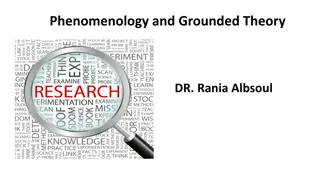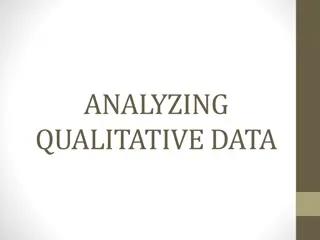SFU Library - Assignment Support
Get support for your Criminology 321 qualitative research methods assignment, including finding academic resources, search terms, and locating qualitative research.
2 views • 28 slides
Analyzing Qualitative and Quantitative Data
The findings from qualitative and quantitative data analysis. Learn how to apply analysis steps, compare platforms, and interpret results.
0 views • 33 slides
Mindfulness-Based Intervention for Adolescents with Chronic Migraine: Qualitative Study
This study focuses on developing a mindfulness-based intervention for adolescents with chronic migraine, aiming to address the lack of effective treatments. Through remote interviews and qualitative analysis, stakeholders' experiences and feedback are being gathered to adapt the intervention. The re
0 views • 15 slides
Understanding Dummy Variables in Regression Analysis
Dummy variables are essential in regression analysis to quantify qualitative variables that influence the dependent variable. They represent attributes like gender, education level, or region with binary values (0 or 1). Econometricians use dummy variables as proxies for unmeasurable factors. These
3 views • 19 slides
Understanding Notional Parts of Speech: Adjectives and Adverbs
Exploring the notional parts of speech, this text delves into the properties and functions of adjectives and adverbs. Adjectives describe the qualities of substances, while adverbs characterize actions or qualities. Adjectives can be qualitative or relative, with degrees of comparison, while adverbs
1 views • 25 slides
Understanding Quantitative and Qualitative Research Methods
Exploring the differences between quantitative and qualitative research methods, this content delves into the importance of qualitative research, various methodologies such as focus groups and interviews, data collection, research ethics, and analysis techniques. It also covers the elements of the r
4 views • 43 slides
Understanding Qualitative Research: Foundations and Orientations
Explore the foundations of qualitative research and orientations to meaning in Big Q qualitative methods. Delve into the values, characteristics, and theoretical underpinnings of qualitative inquiry, and reflect on the significance of meaning-making in research. Consider the role of subjectivity in
0 views • 23 slides
Understanding the Case Study Method: In-depth Qualitative Analysis
The case study method is a popular form of qualitative analysis involving intensive observation of a social unit. It focuses on detailed analysis of a limited number of events or conditions to understand complex interrelationships. Characteristics include intensive study of a single unit, qualitativ
1 views • 8 slides
Enhancing Natural Experiment Research Through Qualitative Work
Qualitative research plays a crucial role in enhancing natural experiment studies by providing insights into the processes of exposure to interventions, identifying variables influencing exposure likelihood, and determining suitable control groups. Complementary methods within the RE-AIM framework a
0 views • 13 slides
Understanding Qualitative Research in Health Sciences
Qualitative research in health sciences offers a deep understanding of complex topics, giving voice to individuals and groups through non-numerical data analysis. Its flexible reporting style, emphasis on context, and ability to fill gaps in knowledge make it a valuable complement to quantitative me
0 views • 38 slides
Understanding Narrative Research Design in Qualitative Research
Narrative research is a qualitative research approach that focuses on sharing individuals' stories. Researchers collect and interpret personal narratives to understand individual experiences. Key characteristics, data collection methods, steps, and ethical considerations in narrative research are ex
0 views • 20 slides
Protein Qualitative Tests and Precipitation Methods
Qualitative tests of proteins involve reactions producing colored products, such as the Biuret test specifically detecting peptide bonds. Protein precipitation methods are used for concentration and purification, affected by factors like pH, temperature, salts, and heavy metals. Different techniques
1 views • 17 slides
Qualitative Credit Control Methods Explained
Selective/Qualitative credit control methods involve regulating the quality and direction of credit flows by implementing controls such as ceilings on credit, margin requirements, discriminatory interest rates, directives, direct action, and moral suasion. These methods are used by central banks lik
0 views • 7 slides
Qualitative Data Analysis Techniques in Research
The purpose of data analysis is to organize, structure, and derive meaning from research data. Qualitative analysis involves insight, creativity, and hard work. Researchers play a crucial role as instruments for data analysis, exploring and reflecting on interview discussions. Steps include transcri
1 views • 27 slides
Using Qualitative Methods in Quality Improvement Projects
Qualitative methods offer valuable insights in quality improvement projects by capturing non-numerical information like experiences, thoughts, and perspectives. They help to understand patient and staff perspectives, challenges, and successes in QI initiatives. Utilizing techniques such as interview
1 views • 21 slides
Understanding Focus Group Discussions in Qualitative Research
Focus Group Discussion (FGD) is a qualitative research method that involves a structured discussion among a group of participants led by a skilled moderator. The aim is to gather insights, opinions, and consensus on a specific topic. FGDs facilitate interaction, generate new ideas, and offer deeper
0 views • 18 slides
Understanding Experiential vs. Critical Qualitative Research
Delve into the foundations of qualitative research with a focus on experiential and critical approaches. Explore key concepts, defining characteristics, and theoretical foundations, distinguishing between qualitative and quantitative research. Reflect on different orientations, subjectivity, and ref
0 views • 16 slides
Exploring Key Characteristics of Qualitative Research in Psychology
The lecture series delves into the values, characteristics, and theoretical foundations of qualitative research, emphasizing the differences from quantitative methods. It explores experiential and critical qualitative camps, subjectivity, reflexivity, and ontological and epistemological foundations.
4 views • 18 slides
Ensuring Trustworthiness in Qualitative Research Studies
Trustworthiness in qualitative research is essential for establishing confidence in the study outcomes. Guba's four criteria - credibility, transferability, dependability, and confirmability - provide a framework for achieving trustworthiness. Strategies such as adopting reliable research methods, u
3 views • 10 slides
Understanding NVivo: A Brief Introduction to Qualitative Data Analysis Software
Explore the world of NVivo with Dr. Will Fassbender, an Assistant Professor at Montana State University. Gain insights into qualitative data analysis, download procedures, basic functions, and more. Join this introductory session to discover how NVivo can streamline your research process and aid in
0 views • 16 slides
Contrasting Qualitative and Quantitative Traits in Genetics
Genetic traits in organisms can be qualitative or quantitative, with qualitative traits controlled by single genes and showing distinct variations, while quantitative traits are influenced by multiple genes and environmental factors, resulting in continuous variations. Qualitative genetics focuses o
0 views • 13 slides
Understanding Research Paradigms in Qualitative Medical Research
Delve into the world of research paradigms in qualitative medical research with a focus on the key differences between objective and subjective research, the meaning of research paradigms, components of research paradigms, types of research paradigms, and how paradigms guide the selection of researc
0 views • 42 slides
Understanding Phenomenology and Grounded Theory in Qualitative Research
Phenomenology and Grounded Theory are key methods in qualitative research, focusing on understanding lived experiences and developing deep insights into phenomena. Phenomenology delves into the essence of appearances, while Grounded Theory explores the grounded elements of research. Through these me
1 views • 44 slides
Qualitative Analysis of Aldehydes and Ketones in Chemistry Lab
In this Chemistry 318 lab, students will conduct qualitative analysis of aldehydes and ketones using chemical and spectroscopic methods. The lab includes classification tests, spectroscopy (IR, 1H-NMR/13C-NMR, MS), and identification of unknown compounds. Experimental procedures involve physical eva
1 views • 11 slides
Understanding Quantitative Genetics Principles in Animal Breeding
Quantitative genetics focuses on the inheritance of characteristics based on degree rather than kind, compared to qualitative genetics. It involves polygenes controlling quantitative traits, which exhibit continuous variation and can be measured using metric units. Qualitative traits, on the other h
0 views • 22 slides
Understanding Qualitative Methodology: An Overview
This presentation delves into the realm of qualitative methodology, exploring its purpose, characteristics, approaches, data collection methods, analysis, and learning outcomes. It aims to provide a deep understanding of how qualitative research illuminates voices and experiences, distinguishes betw
0 views • 41 slides
Qualitative Approaches in a Data-Intensive World
Qualitative research involves studying perceptions, experiences, and behaviors through verbal or visual expressions. In a data-intensive world, online communication plays a crucial role in data collection. Qualitative eResearch utilizes Information and Communication Technologies (ICTs) strategically
0 views • 10 slides
Meaning and Meaning-making in Big Q Qualitative Research
Qualitative research explores different understandings of meaning and meaning-making, providing researchers with tools, techniques, and values. Big Q qualitative research focuses on the active role of words in creating meaning beyond reflecting experiences. This lecture series delves into the founda
1 views • 20 slides
Analyzing Qualitative Data: Steps and Coding Methods
Understanding qualitative data analysis involves several key steps, such as preparing the data through transcription, developing codes and categories using content analysis, revising categories based on the data, and reporting the analysis results. Content analysis helps in identifying words, themes
0 views • 32 slides
Design Philosophy for Increasing Accessibility in Qualitative Data Analysis Software
Growing interest in qualitative research methods has led to increased use of Qualitative Data Analysis Software (QDAS). However, challenges remain in making these tools accessible and easy to use, especially in educational settings. This article explores design philosophies to enhance accessibility
0 views • 16 slides
Analyzing U.S. Higher Education Success Metrics: A Qualitative Perspective
Delve into the nuances of U.S. higher education success metrics through a qualitative analysis, exploring the classification of qualitative successes in quantitative datasets and the factors influencing accurate or inaccurate classifications. The study involves individuals who attended community col
0 views • 18 slides
Student Perspectives of Team-Based Learning in a CS Course: Qualitative Findings
Qualitative findings from a study on Team-Based Learning (TBL) in a CS course, discussing TBL implementation, pre-module preparation, readiness assurance process (RAP), application activities, major assessments, and prior results. The study explores student perspectives on TBL methodology and its im
0 views • 18 slides
Perceived Risks and Risks Mitigation Practices in Informal Waste Workers: A Qualitative Study
A qualitative study conducted in Kathmandu Valley exploring the perceived risks and mitigation practices of informal waste workers. The research project, led by Sujata Sapkota, aims to address the occupational and health challenges faced by these workers. The study includes a mix of quantitative and
0 views • 22 slides
Strategies for Collective Qualitative Secondary Analysis Using Combined Datasets
Collective qualitative secondary analysis involves reusing data through a collaborative lens, embracing multiple viewpoints to gain deeper insights. The approach emphasizes the constructed nature of research data and allows for diverse interpretations and engagements. This article discusses the proc
0 views • 15 slides
Understanding Research Methods in Public Health
Exploring the nuances of qualitative and quantitative research methods in the context of public health, this content delves into how each approach offers unique insights and perspectives. It discusses the importance of qualitative research in uncovering underlying factors influencing health, interpr
0 views • 77 slides
Qualitative Approach in Cognitive Interview Data Analysis
Understanding the importance of a qualitative approach in analyzing cognitive interview data is crucial for uncovering patterns and recurring themes. This involves delving deeper into the why behind the responses rather than just naming and classifying data. Using methods like standardised coding sc
0 views • 18 slides
Creative Problem Solving through High-level Qualitative Planning and Reasoning
Explore the world of abstract and high-level qualitative planning through examples like MacGyver's inventive solutions, opening jar tricks, and audience participation in problem-solving. Witness how qualitative reasoning can lead to innovative solutions in various scenarios.
0 views • 15 slides
Understanding Qualitative Data in Counseling
Exploring the challenges and strategies in utilizing qualitative data in counseling, this discussion covers topics such as data collection, coding for meaning, and presenting qualitative evidence. The importance of qualitative data in improving counseling programs and student services is highlighted
0 views • 32 slides
Understanding Research Data Collection and Importance
Research data is essential for validating original research findings and can take various forms, both digital and non-digital. It plays a crucial role in improving lives, making informed decisions, solving problems, and ensuring strategic approaches. Data can be qualitative or quantitative, with qua
0 views • 41 slides
Foundations of Qualitative Research: Understanding Methods and Data
Qualitative research involves a mix of different methods drawing on qualitative data, with debates on the need for a sensitive approach for richer appreciation. Understanding qualitative data and context, along with various types of data such as interviews and user-generated content, is essential fo
0 views • 41 slides







































